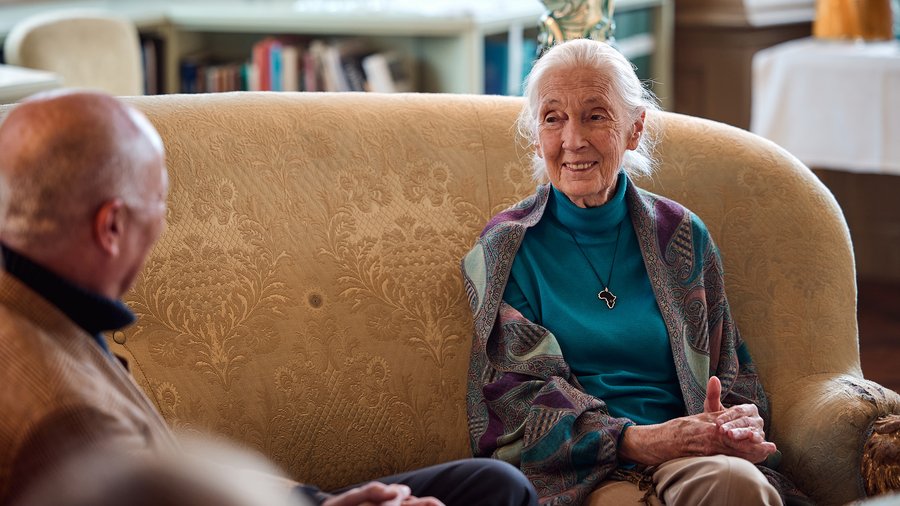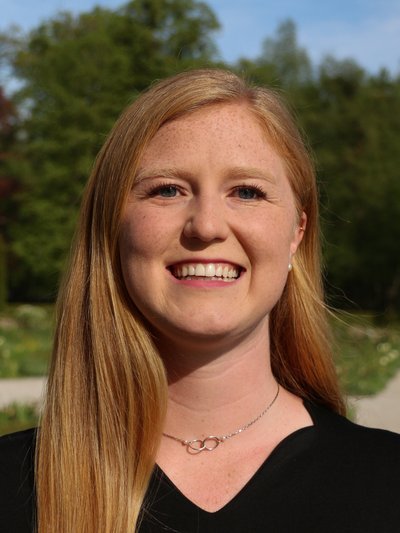At Salzburg Global, the renowned ethologist, conservationist, UN Messenger of Peace, and founder of the Jane Goodall Institute shared a message of hope
Jane Goodall is renowned for her groundbreaking fieldwork with chimpanzees, but nowadays, she is turning her attention to humanity.
Her lifelong dedication to environmental advocacy speaks volumes. At 90 years old, she spends her time differently from most people, traveling nearly 300 days a year to deliver a powerful message of hope through action.
Jane visited Salzburg Global as part of her latest worldwide tour, where she is visiting all 27 countries where the Jane Goodall Institute operates. While at Schloss Leopoldskron, she sat down with Martin Weiss, president and CEO of Salzburg Global, to share her thoughts on the power of hope against the challenges we face.
The Power of Hope
Jane’s philosophy revolves around her four reasons for hope: the amazing human intellect, the resilience of nature, the power and dedication of young people, and the indomitable human spirit.
For Jane, hope is not a passive state of mind but a state of action. "Hope isn't just wishful thinking. I think action leads to hope. When you start doing something to make the world better, that gives you some hope because you wouldn't do it if you didn't have hope for the future," she explained.
Through education, awareness, and community engagement, she believes individuals can drive positive change at both local and global levels.
From Individual Action to Global Change
Jane believes that small, local actions can collectively contribute to large-scale change. “Every individual matters,” she often says, emphasizing the importance of personal responsibility in reducing our human impact on the planet.
Humanity is facing a multitude of current challenges, as Jane pointed to the examples of climate change, loss of species and biodiversity, and environmental damage. Poverty, overconsumption, and human population growth put an additional strain on our natural resources.
In addition, Jane highlighted the challenges posed by unstable political climates, particularly in parts of Africa, and the "very troubling" rise of far-right ideologies globally, which complicate efforts to address environmental crises. She stressed the importance of legislation to protect the environment but added, “We need not just the politicians, but corporations, too.”
"We have to make some change in the way we do things," she urged, highlighting the need for renewable energy and sustainable practices. Humans should use their "amazing intellect" to "find ways of living in more harmony" with the environment.
A Lifelong Commitment to Conservation
Jane Goodall is deeply committed to environmental conservation and sustainability, which has been at the heart of her lifelong work. She has dedicated her life to the preservation of nature and is vocal about issues like deforestation, climate change, and industrial farming, among others. She advocates sustainable development that balances human needs with the health of the planet.
Although she grew up eating meat, Jane became a vegetarian and later a vegan after learning about the environmental harm caused by industrial animal farming and witnessing the cruelty behind it. “What’s wrong today is the amount of meat people are eating and the harm it’s doing to the environment,” she explained.
Africa at the Heart of Her Work
Jane’s connection to the African continent began as a child, inspired by reading “Tarzan of the Apes”. Years later, she arrived in Tanzania’s Gombe Stream National Park, where she embarked on her pioneering research.
She vividly recalls her early days in Tanzania: driving through the Serengeti, marveling at the wild animals, patiently observing wild chimpanzees, and establishing a "strong connection with some kind of spiritual power" while alone in nature.
From the start, Jane worked closely with local communities, fostering mutual respect with people living there. She grew up "thinking not of skin color as being important, but who you are as a human being," a perspective that has shaped her work in African countries and beyond.
She continues to champion sustainable agriculture and conservation efforts that engage local communities to ensure that development aligns with the protection of natural resources. For her, environmental sustainability is not just about protecting wildlife but creating a harmonious coexistence between humans and nature, where future generations can thrive.
Empowering the Next Generation
Jane has one ultimate hope for the future: youth. Her Roots & Shoots program, active in 71 countries, empowers young people to create positive change for their communities, animals, and the environment. Through hands-on projects, the program inspires environmental stewardship and global citizenship.
She firmly believes in the potential of young people to shape a better world. As she put it, "Every one of us makes an impact on the planet every single day,” so let’s make sure it is a positive one.
When asked what her next adventure might be, Jane answered with her characteristic candor: “Dying.” But even in this, she expressed hope, aspiring to leave a legacy that inspires change long after her lifetime. Her message is clear: through collective action and a commitment to hope, a brighter future is within reach.
Jane Goodall’s visit to Salzburg Global was organized in cooperation with the Jane Goodall Institute Austria.



